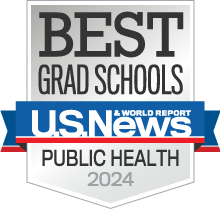Student Spotlight: BreAnne "Bre" Young, MSPH, Ph.D. in Prevention Science and Community Health Candidate
 BreAnne “Bre” Young, a double University of Miami alumna, graduated with a Bachelor of Science in psychology in 2014 and with a Master of Science in Public Health in 2016. Upon graduating, she began working at the Community-Based HIV Awareness for Minority Populations (CHAMP) program, a street-based, rapid-HIV testing initiative that employs community health workers to administer HIV tests in any location. She is now beginning the Ph.D. in Prevention Science and Community Health program and will focus her dissertation on the efficacy of the program.
BreAnne “Bre” Young, a double University of Miami alumna, graduated with a Bachelor of Science in psychology in 2014 and with a Master of Science in Public Health in 2016. Upon graduating, she began working at the Community-Based HIV Awareness for Minority Populations (CHAMP) program, a street-based, rapid-HIV testing initiative that employs community health workers to administer HIV tests in any location. She is now beginning the Ph.D. in Prevention Science and Community Health program and will focus her dissertation on the efficacy of the program.
Young, who is a South Florida native, grew up in Jupiter, Fla. and recalls taking frequent trips to Miami with her family while she was growing up. These frequent road trips, she shared, drove her desire to apply and attend the University of Miami.
“My parents always loved Miami. They would take weekend trips there all the time when they first met, and they continued the trips as they started our family. I eventually went to UM for my undergraduate and graduate career,” Young said.
As an undergraduate, she worked as an assistant program coordinator for the Integrative & Complementary Academic Medicine Programs (iCamp) at the Miller School. This opportunity strengthened her desire to pursue a career in public health.
“The physicians that I worked with at iCamp, a program that was part of the Department of Family Medicine & Community Health, were very public-health oriented,” Young said. “Dr. Janet Konefal, my manager at the time, really encouraged me to pursue my master’s in public health at the Miller School.”
Monica Webb-Hooper, Ph.D., a former tenured associate professor of psychology at UM and Young’s research advisor at the time, also encouraged Young to pursue a graduate career in the field.
In 2014, Young began the Master of Science in Public Health (MSPH) program at the Miller School’s Department of Public Health Sciences. As a graduate student, Young worked in various positions within the department, including as an administrative assistant, as a graduate research assistant in the Division of Environmental Health, and as a teaching assistant for the M.D./M.P.H. Medical Biostatistics course, as well as for the Integrated Aspects of Environmental Health course.
“I had an amazing experience as a student. I really felt myself flourish academically, professionally, and socially as a graduate student,” Young said.
Young currently has four published publications and three that are currently under review. The published studies are on using community health workers to translate HIV research to service, on a Hispanic secondary stroke prevention initiative design, as well as on an illustrated approach to HPV and cervical cancer education among Haitian women. Young was also a co-author on a study focused on the perceptions of health and cancer risk among newly recruited firefighters in South Florida. These studies were all published in AIDS & Behavior, JMIR Research Protocols, Journal of Haitian Studies, and in the American Journal of Industrial Design.
For her MSPH thesis presentation, Young based it on environmental and occupational health, a topic that she said is very different from what she is pursuing now.
After graduating, Young worked as a program facilitator for Pathway of Emphasis in Social Medicine at the Jay Weiss Institute for Health Equity at the Sylvester Comprehensive Cancer Center. She also worked as a research associate instructor at the Miller School's Office of Diversity and Inclusion in Graduate Medical Education.
Currently, she is the program manager of the CHAMP program, which is housed in the Division of General Internal Medicine at the Miller School.
In her last semester as an MSPH graduate student, she began working with Sonija Kenya, Ed.D., M.S., M.A., an assistant research professor of medicine at the Miller School, who also founded the program.
Dr. Kenya conceived the CHAMP program while watching a television commercial about OraQuick, the first Florida Drug Administration (FDA)-approved oral swab in-home test for HIV-1 and HIV-2.
“Following that commercial, I applied for a small grant from the Clinical and Translational Science Institute to pilot test the CHAMP model. Upon being awarded the grant, my team demonstrated the CHAMP model was a culturally-acceptable way to increase HIV testing rates and linkage to HIV care among those that test positive,” Dr. Kenya said.
Dr. Kenya hired Young during her last semester and within a week of her graduation, Dr. Kenya received funding from the Elton John AIDS Foundation to implement the program. From there, Young transitioned from a student employee to a full-time program manager.
Their aim was to provide HIV education and testing services for 5,000 black adults in Miami-Dade County within one year. To help CHAMP reach their goal, Young also filled in as a community health worker and HIV counselor besides being the program manager.
While they never made it to 5,000 that year, the program still had a visible impact in the community that eventually led to more funding sources for the program
“Today, our CHAMP program is funded by the Florida Department of Health (DOH) as the largest street-based HIV testing program in Miami-Dade,” Dr. Kenya said.
Over the years, the CHAMP team grew to consist of one full-time and two part-time community health workers, two capstone students, two pre-med volunteers, and a growing group of community members who encourage others to get tested and share HIV education around the community.
“I can honestly say that no one has contributed more towards sustaining and growing CHAMP than Bre. In addition to applying her intellect towards organizing program logistics, hiring and managing community health workers, and coordinating day to day operations, Bre has always been focused on expanding CHAMP, which led to our current funding from the DOH," Dr. Kenya added.
Young began the Ph.D. in Prevention Science and Community Health program at the Miller School's Department of Public Health Sciences.
After working in community-based research for the last few years, she became really invested in understanding how to make evidence-based programs successful and sustainable.
“As we expand our services, I think it’s important to understand the cost of our program in comparison to the cost of other community-based organizations,” she added.
Her dissertation will focus on conducting a cost-benefit analysis, as well as a return on investment to evaluate how the CHAMP program compares to other organizations.
“UM is one of the only schools that have a curriculum specifically centered around prevention and implementation science, so I’m really looking forward to starting and delving into the program,” Young said.
Written by Amanda Torres
Published on August 20, 2019



 BreAnne “Bre” Young, a double University of Miami alumna, graduated with a Bachelor of Science in psychology in 2014 and with a Master of Science in Public Health in 2016. Upon graduating, she began working at the Community-Based HIV Awareness for Minority Populations (CHAMP) program, a street-based, rapid-HIV testing initiative that employs community health workers to administer HIV tests in any location. She is now beginning the Ph.D. in Prevention Science and Community Health program and will focus her dissertation on the efficacy of the program.
BreAnne “Bre” Young, a double University of Miami alumna, graduated with a Bachelor of Science in psychology in 2014 and with a Master of Science in Public Health in 2016. Upon graduating, she began working at the Community-Based HIV Awareness for Minority Populations (CHAMP) program, a street-based, rapid-HIV testing initiative that employs community health workers to administer HIV tests in any location. She is now beginning the Ph.D. in Prevention Science and Community Health program and will focus her dissertation on the efficacy of the program. 
